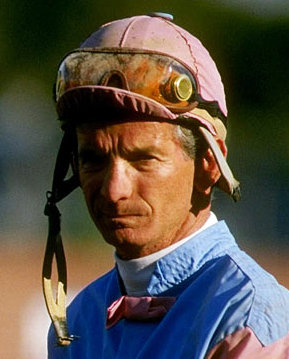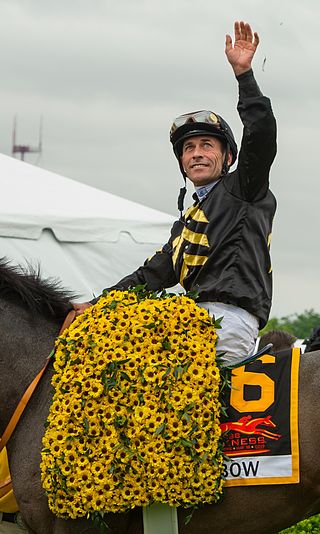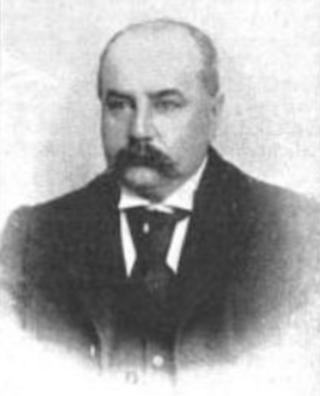
Richard Stanley Francis was a British steeplechase jockey and crime writer whose novels centre on horse racing in England.

William Lee Shoemaker was an American jockey, considered one of the greatest. For 29 years he held the world record for the most professional jockey victories.

Lester Keith Piggott was an English professional jockey and horse trainer. With 4,493 career flat racing wins in Britain, including a record nine Epsom Derby victories, he is widely regarded as one of the greatest flat racing jockeys of all time and the originator of a much-imitated style. Popularly called "The Long Fellow", he was known for his competitive personality, restricting his weight and, on occasion, not sparing the whip, such as in the 1972 Derby. Piggott was convicted of tax fraud in 1987 and sentenced to three years in prison, but served just over a year.

Gary Lynn Stevens is an American Thoroughbred horse racing jockey, actor, and sports analyst. He became a professional jockey in 1979 and rode his first of three Kentucky Derby winners in 1988. He had nine wins in Triple Crown races, winning the Preakness Stakes and Belmont Stakes three times each, as well as ten Breeders' Cup races. He was also a nine-time winner of the Santa Anita Derby. He entered the United States Racing Hall of Fame in 1997. Combining his U.S. and international wins, Stevens had over 5,000 race wins by 2005, and reached his 5,000th North American win on February 15, 2015.

The Black Stallion is the name of a bestselling series of books by Walter Farley, and also the name of the first book in the series, and the title character, an Arab stallion also known as the Black or Shêtân. The series chronicles the story of a Sheikh's prized stallion after a ship journey gone awry brings it into the possession of a young man named Alec Ramsay. Later books in the series furnish the Black's backstory. Shaytan is the Arabic word for "devil".

Francis Buckle (1766–1832), known to the British horse racing public as "The Governor", was an English jockey, who has been described as "the jockey non-pareil" of the opening quarter of the 19th century, and the man who "brought respectability to race-riding". He won at least 27 British Classic Races during his career, a record which would not be beaten for over 150 years.
Sid Halley is a fictional character in four Dick Francis novels, Odds Against, Whip Hand, Come to Grief, Under Orders and two follow-up books by Felix Francis, Refusal and Hands Down. He is a former British jump racing Champion Jockey and private detective. He is the only central character to appear in more than two Francis novels, and one of only two to appear more than once.
Shane Jude Sellers is an American Thoroughbred horse racing jockey. At age eleven, he began working around horses and in 1983 rode his first winner at Evangeline Downs.

Victor Espinoza is a Mexican jockey in American Thoroughbred horse racing who won the Triple Crown in 2015 on American Pharoah. He began riding in his native Mexico and went on to compete at racetracks in California. He has won the Kentucky Derby three times, riding War Emblem in 2002, California Chrome in 2014, and American Pharoah in 2015. He also won the Preakness Stakes three times, in those same years and with the same horses. He was the first jockey in history to enter the Belmont Stakes with a third opportunity to win the Triple Crown; his 2015 victory made him the oldest jockey and first Hispanic jockey to accomplish the feat. He joined Ron Turcotte as the only jockeys to win five of the six jewels of the Triple Crown spread over two consecutive years.

Nathaniel Gould was a British novelist. He was a best-selling author in his lifetime.

Secretariat is a 2010 American biographical sports drama film produced and released by Walt Disney Pictures, written by Mike Rich and Sheldon Turner based largely on William Nack's 1975 book Secretariat: The Making of a Champion, with music by Nick Glennie-Smith and directed by Randall Wallace. The film chronicles the life of Thoroughbred race horse Secretariat, winner of the Triple Crown in 1973. Diane Lane plays Secretariat's owner, Penny Chenery, who takes over the Doswell, Virginia, stables of her ailing father Christopher Chenery despite her lack of horse-racing knowledge. With the help of veteran trainer Lucien Laurin, she navigates the male-dominated business, ultimately fostering the first Triple Crown winner in 25 years and widely considered the greatest racehorse of all time.
The Great Mike is a 1944 American film directed by Wallace Fox.

Dead Cert is a 1974 British crime thriller film directed by Tony Richardson and starring Scott Antony, Geoffrey Bateman and Judi Dench. It was written by ex jockey and Daily Telegraph racing correspondent Lord John Oaksey and Richardson, adaptated from the 1962 novel of the same name by Dick Francis. Oaksey was also technical advisor and a riding double in the film.
Horse racing in Wales has a long tradition dating back to the 18th century. Wales has held flat racing, National Hunt and harness racing, and presently has three racecourses, at Chepstow, Bangor-on-Dee and Ffos Las. The Welsh Grand National is held annually at Chepstow between Christmas and New Year and is the highlight of the Welsh racing calendar.

Tom Cannon Sr. was a British flat racing jockey and trainer. He won 13 British classics as a jockey, becoming champion in 1872. As a trainer, he trained classic winners, as well as winners over jumps, including the 1888 Grand National. He was the father of four jockey sons, including the six-times champion, Morny Cannon, and the great-grandfather of eleven-times champion, Lester Piggott.

Blue Grass of Kentucky is a 1950 American sports drama film directed by William Beaudine and starring Bill Williams, Jane Nigh, and Ralph Morgan.

The Favorite is a two-part film based on the 1962 detective novel of British writer Dick Francis, Dead Cert. For the first time the Soviet Central Television was demonstrated on 13 and 14 September 1977.
Anthony Ciulla, later Tony Capra was an American criminal, convicted of bribing jockeys and fixing horse races. He was connected to the Boston-based Winter Hill Gang and later testified against several members of the organization.

In the Frame was Dick Francis' fourteenth novel, published by Michael Joseph in 1976. Its US release was by Harper and Row in 1977.
Ron Hutchinson is a retired Australian jockey, who won over 1000 races in Europe. In a 37-year racing career, he was successful across three continents.














